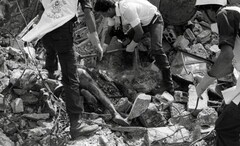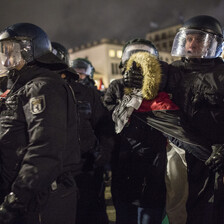The Electronic Intifada 18 April 2005
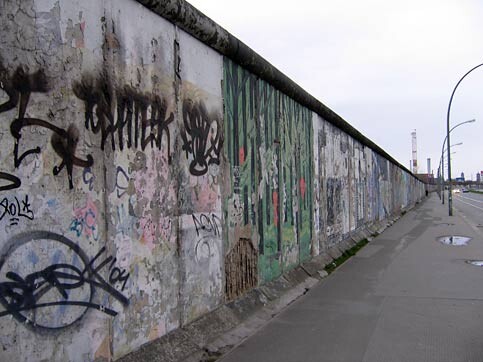
The Berlin Wall. (Photo: Victor Kattan)
Walking on the streets of Berlin, one cannot help but notice Germany’s troubled past. Despite the passage of time, the war, National Socialism, and the Shoah (“Holocaust”) are evident wherever one goes, in the form of monuments, museums and historical sites. The names of victims line sidewalks engraved in small, square, bronze plaques.
In East Berlin, remnants exist of a wall from the Soviet era that turned West Berlin into an enclave in East Germany. The graffiti on the eastern side of the wall (which, of course, could not exist prior to 1989) includes a mural of the German, Israeli and Palestinian flags symbolising the importance of this relationship.
In April 2005, almost 15 years since German reunification and some 60 years after the Second World War, 21 young journalists of German, Israeli and Palestinian origin, including myself, were invited to take part in a trialogue organised by the German Federal Government, the Goethe Institut and the Herbert-Quandt-Stiftung Foundation.
The purpose of the trip was to bring aspiring journalists together to produce a newspaper called “The Bridge”, to visit cultural institutions and to meet with government officials. The trialogue was scheduled to meet with Joschka Fischer, Vice-Chancellor and Foreign Minister of the Federal Republic of Germany, but unfortunately he had to cancel his meeting with us at the last minute. Instead we met with his Middle East advisor, Dr. Horst Freitag.
April 2005 is significant since it marks 40 years of diplomatic relations between Germany and Israel. This has included cooperation in the economic, social and agricultural spheres. It has also, somewhat controversially, included direct military assistance to Israel. This year, Fischer decided to transform the dialogue into a trialogue - so as to include Palestinians from Israel and the Occupied Territories, Jordan, Germany and the United Kingdom - reflecting the diaspora status of the Palestinian people.
At the German School of Journalism in Munich, the trialogue struggled over a 2-day period to produce “The Bridge”. Predictably, the final product displayed differences of opinion regarding Israel’s wall, the battle of Jenin, “objectivity”, and what constitutes a news story. Meetings were arranged with Stefan Kornelius of Sueddeutsche Zeitung and David Dadge of the International Press Institute (IPI).
In Berlin, visits were made to the House of the Wannsee Conference, where it is said the “Final Solution” (the mass murder of European Jewry) was intricately planned. Palestinians expressed disgust at what they saw, learnt and heard, whilst some of the Israeli delegates (some having lost grandparents at Auschwitz) left the confines of this house of horror to reflect outside. People from all three delegations were astonished when they were told of Nazi concentration camps set up in North Africa for Jews and Arabs.
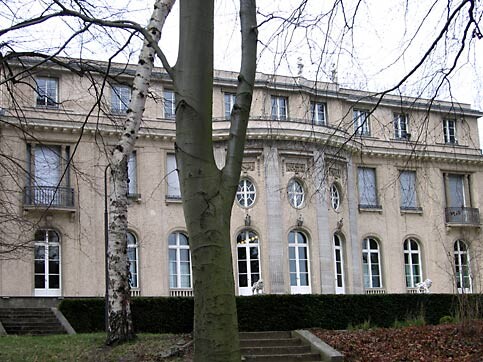
The location of the Wannsee Conference, where the Holocaust was planned. (Photo: Victor Kattan)
In the German Chancellery, Palestinians were frustrated at comments by Heidrun Tempel, Head of Division for Church and Religious Communities, concerning anti-Semitism and “hatred from mosques” without also mentioning the problems of Islamophobia and Arabophobia in European society. During her speech, she neglected to mention, even once, Palestine or the Palestinians (even though we were present), getting defensive when confronted with this.
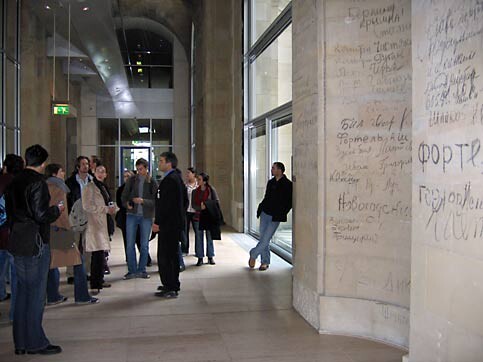
Participants in the Reichstag (Germany’s parliament) stand next to graffiti written by Soviet troops in 1945. (Photo: Victor Kattan)
Across Yitzhak Rabin StraBe (“Yitzhak Rabin Street”) in the Reichstag (Germany’s parliament), the trialogue participants were shown graffiti written by Soviet troops during Berlin’s liberation in 1945, recently uncovered behind plaques in the building. The participants were then given a tour of Norman Foster’s Dome and shown around the building. Later on we would meet Anna Luehrmann, the youngest Member of Parliament for the Green Party, elected at the age of 19.
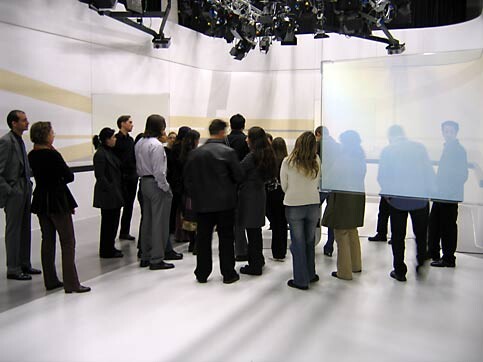
The participants visiting a studio of Deutche Welle (“Voice of Germany”). (Photo: Victor Kattan)
Visits to Deutsche Welle (“The Voice of Germany”), the European Academy, and the Federal Foreign Office followed. Friendships were made across delegations, but there was one question that consistently crossed our minds during the visit: can Germany play a role as a neutral mediator in the Israel-Palestine conflict?
The answer to this is complex and multi-faceted, for Germany’s past hinders its room for manoeuvre in its relations with Israel and the Jewish people today. During the trip, German speakers and delegates acknowledged that Germans think at least twice before criticising Israel.
Self-censorship is already a problem among Western journalists. In Germany it seems to be endemic. Yet journalists are supposed to be “objective” or “impartial” and are supposed to make some attempt at seeing both sides of the conflict. The German-Israeli-Palestinian trialogue was an attempt at doing just that and, after 40 years, it was about time.
To improve the trialogue for future generations, more concern, understanding and appreciation should be given to the Palestinian narrative, as this was largely ignored in the trialogue. This neglect was acknowledged by the Israeli and German delegates. The Nakba — the expulsion and exodus of some 750,000 Palestinians from their homeland — needs to be fully understood. Coincidentally, Nakba and Shoah mean the same thing in both Arabic and Hebrew — catastrophe.
During a discussion on our last evening with Mohammed Nazzal, Press Relations Officer of the Palestine General Delegation in Germany, it became evident that there is little knowledge of the Nakba in Germany today. Palestinian groups in Germany are small, disparate, and disorganised. The Al-Awda coalition is weak in Germany, unlike in France, Holland, the UK, and US.
Whilst Germany has a special responsibility towards the Jewish people, it also has an indirect responsibility towards the Palestinian people. To coin a phrase from Afif Safieh, Palestinian General Delegate to the UK and Holy See, the Palestinians are “the Jews of the Jews” — the victims of the victims.
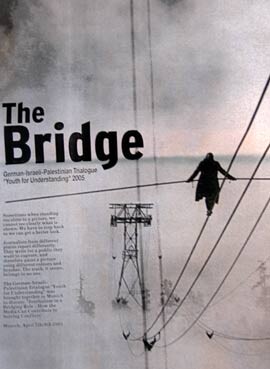
The cover of the “The Bridge”, the newspaper produced through the trialogue, at the German School of Journalism in Munich. (Photo: Victor Kattan)
There are two peoples in the Israel-Palestine conflict. One people, the Jewish people, were practically wiped out from the countries they had inhabited for centuries in Europe. The other people, the Palestinian people, were displaced from the land they had inhabited for centuries; in a place called Palestine.
Today, Jews from all over the world can go to Israel, regardless of whether or not they have any actual connection to it. They can also return to some of the countries from where they were displaced, receive compensation and full citizenship rights.
Palestinians, however, cannot return to their homeland. They have not been compensated. They remain stateless, without citizenship, travel and employment rights. Their human rights, which are supposed to be non-derogable, are severely curtailed.
Journalists in Germany should not forget their past, but they should not let it stop them from doing their work fairly and objectively, and writing about the real and present problems in the Middle East today.
Victor Kattan, Director of Arab Media Watch and an occasional contributor to EI, was a Delegate at the “German-Israeli-Palestinian Trialogue” which took place in Munich and Berlin from 6-13 April 2005. You can reach him at victor@arabmediawatch.com.



